
Nepalese People of Upper Dolpa Struggle to Sustain Livelihoods Amidst Chinese Border Closure
For over four years, the closure of China’s borders with the high Himalayan districts has been evident to everyone, signaling the cessation of trade through the vital Tibetan market that serves as the primary trading hub for the residents of these Himalayan regions.
Despite being raised intermittently in the meetings of the House of Representatives, National Assembly, Provincial Assembly, and local bodies, this issue remains unresolved, with no conclusive decisions made. Despite ongoing high-level visits from China, no effective measures have been taken to alleviate the suffering endured by the residents of the high Himalayan district.
It is believed that Nepali nationalism is antiquated, and while the breeze of seasonal nationalism occasionally stirs awareness among the Nepalese, the sentiment itself remains divided and diverse. This brand of nationalism appears to be reticent regarding the strengths of its northern neighbor, and in contemplating the future of its southern neighbor, it fosters apprehension and potential conflicts. Furthermore, at times, it even harbors tensions towards neighboring countries across the sea.
Here, we endeavor to assuage the anguish of the people of Upper Dolpa by embracing this very nationalism.
The closure of the Chinese border has inflicted the most profound impact on the residents of Upper Dolpa, subjecting them to an exceedingly difficult life. The state has turned a deaf ear to the plight of the Himalayan people, while even the representatives of the Federal Parliament have chosen silence. The suffering of the people in the northern part becomes palpable when China shuts its borders, and surprisingly, even the Communist forces of Nepal, claiming to champion the common people’s cause, remain muted. As a consequence of the border closure, the people of Upper Dolpa are compelled to pay an exorbitant price of 6000 rupees for a mere 25 kg of rice.
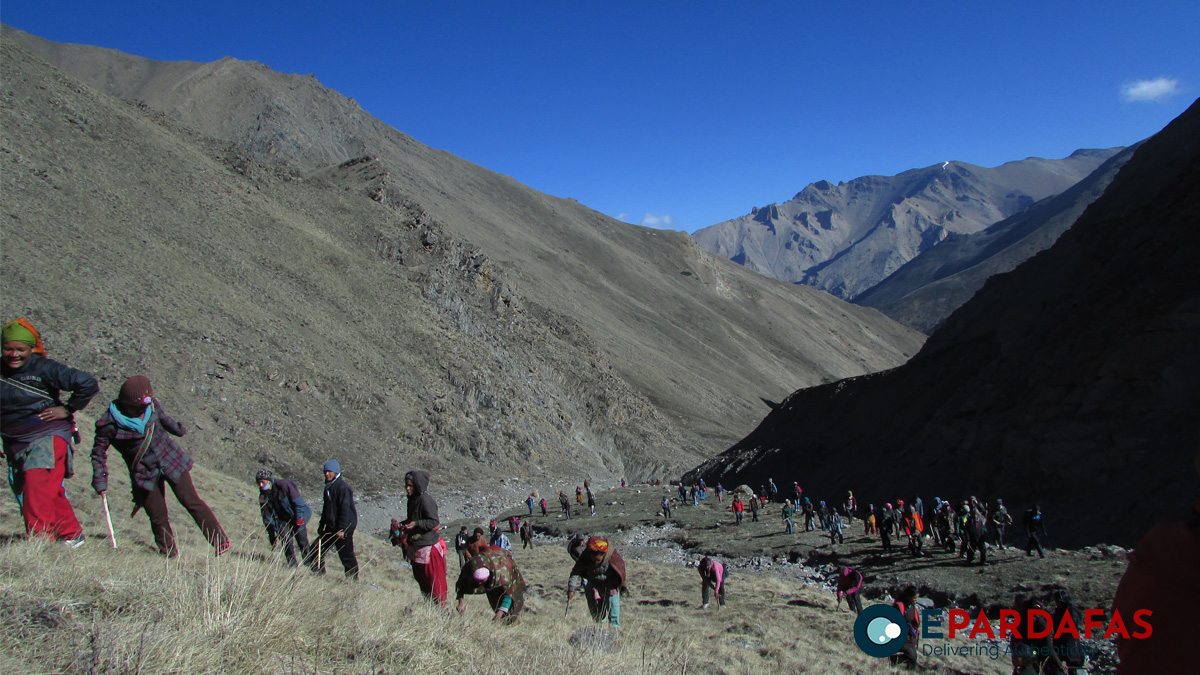
For centuries, Upper Dolpa maintained a vibrant trade relationship with Tibet, where generations of residents sold herbs and various materials to Tibet while procuring essential goods and food items in return. However, this longstanding trade has come to a halt for the past four years due to the closure of the border by China. Consequently, the Yarsagumba trade has dwindled, and even yak herders are facing transportation challenges, resulting in the sale of their yaks.
With the Tibetan border shut, the people of Upper Dolpa are forced to seek provisions from the capital, Dunhi, incurring hefty costs of Rs 6,000 for a 25 kg bag of rice and 200 rupees for a single packet of salt.
The locals express their deep anguish, as their pleas to the federal government to reopen the border have fallen on deaf ears, leaving them to grapple with the repercussions of the prolonged closure.
Following extensive efforts by Nepal, China, the northern neighbor, eventually reopened the Tatopani border. However, due to the outbreak of COVID-19 after the Bukamma of the year 2072, the border remained closed for an extended period, dealing a severe blow to the businessmen reliant on trade with China. Presently, Tatopani and Rasuwagadhi stand as the sole trade ports connecting Nepal with China.
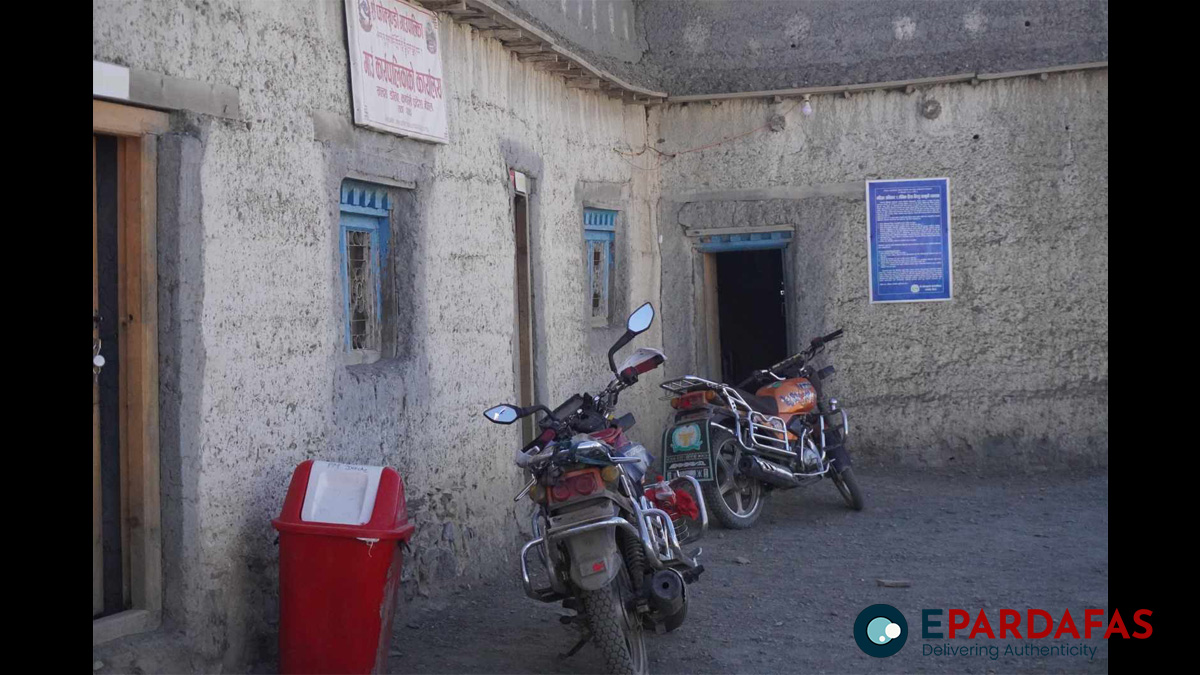
Nevertheless, numerous districts in Nepal heavily rely on the Chinese border for their day-to-day living. In areas where China has not reopened the border, the locals are grappling with the challenges of leading a difficult life. Dolpa, one such district, finds itself in this predicament.
The vital connection of kyato Pass in Tibet with She-Foksundo Rural Municipality of Dolpa and Tibet’s Marimala Pass with Dolpobuddha Rural Municipality has been cut off due to China’s COVID-related border closure. As a result, residents of Dho, Tarap, Taksi, Simen, Saldang, Tinje, Vijer, and other villages in Upper Dolpa, who heavily relied on this route, have been adversely affected. Without access to this trading link, the residents are compelled to purchase consumer goods at inflated prices, significantly impacting their daily lives. Additionally, the lack of a proper road network to the headquarters further exacerbates the situation, forcing them to pay exorbitant prices for essential items due to the continued closure of the Chinese border.
While the federal government invested significant time and effort in initiating talks at ministerial and secretary levels to reopen the Tatopani border crossing, they seem to have overlooked the crucial fact that China has already closed the border in other Himalayan districts.
The inhabitants of Upper Dolpa, who have relied on trade with Tibet for generations, express their dismay and frustration as the border with China remains closed for four long years. Despite the persistent efforts of local people’s representatives to draw the federal government’s attention to this pressing issue, their demands have seemingly fallen on deaf ears, as Chairman Dawa Samduk Gurung of She-Foksundo Rural Municipality lamented.
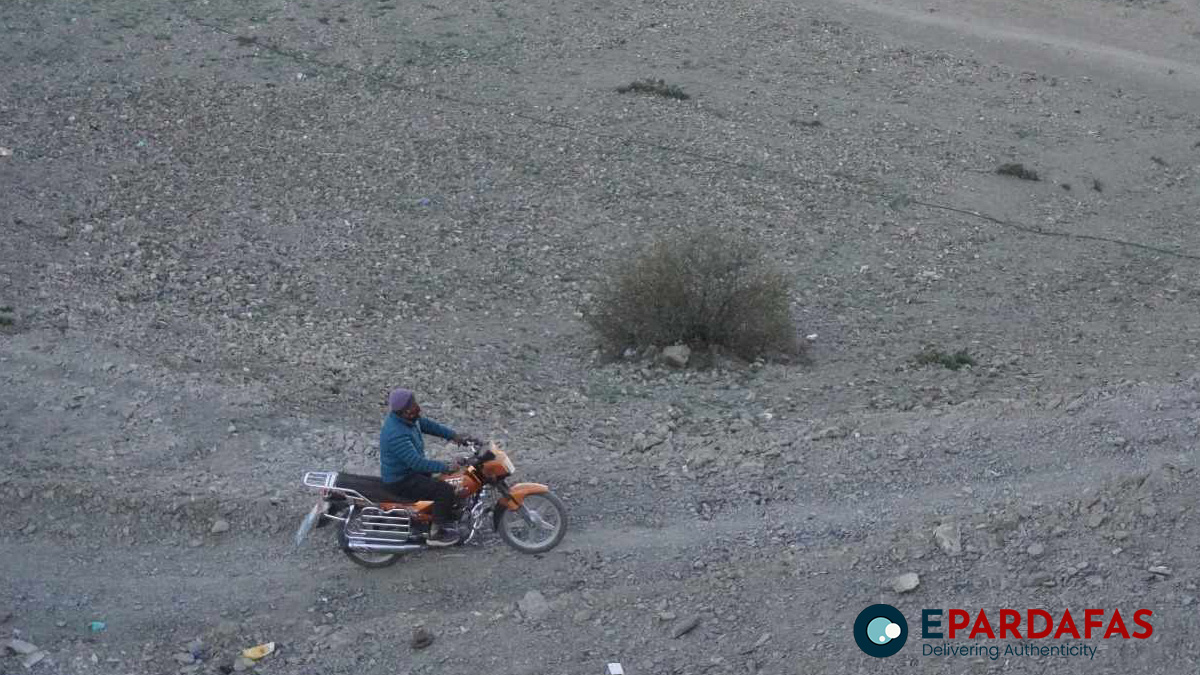
The continued closure of the China border has left the local residents in dire straits, forced to pay exorbitant prices of Rs 6,000 for a 25-kilo bag of rice, as they are compelled to procure goods from Dolpa’s headquarters. In the past, they used to obtain salt, oil, ghee, and other essentials conveniently from Tibet. However, the prolonged border closure has disrupted this age-old trade and pushed the residents into economic hardship and uncertainty.
The people of Dolpa, known for their trade in salt, oil, ghee, yak, and chauri with Tibet, have faced significant challenges in their livelihoods since the border closure. Karma Wangel, a resident of Saldang village in Upper Dolpa, used to transport yaks from Tibetan ports to engage in trade and sell yaks in Tibet. However, due to the four-year-long border closure, he had no choice but to sell 12 yaks last year alone, as they became unproductive and unsustainable without the trade opportunities in Tibet.
In addition to the plight of yak traders, the closure of border checkpoints has also had a considerable impact on the Yarsagumba business in the region. Yarsa’s primary trade route used to be with Tibet, but now, with restricted access, the prices of Yarsagumba in Tibet have become unmatched elsewhere. Nima Lama, the ward chairman of Phoksundo Rural Municipality 8, highlights the decline in Yarsagumba trade as fewer people can go to Tibet to sell the valuable herb.
As the closure of the border persists, the economic hardships faced by the people of Dolpa continue to escalate, forcing them to adapt and find alternative means to support their families.
Before 2020, the Yarsa trade port used to open once a year for just 10 days. China has established temporary revenue offices at Cato and Marimala crossings in Dolpa, but Nepal’s revenue office is yet to be established. Yarsa traders claim that during the Yarsagumba sales and distribution season, China collects revenue under various pretexts like horse grazing and entry fees.
The locals of Upper Dolpa have persistently urged the federal government to reopen the border crossing. Chairman Gurung of the rural municipality reveals their efforts to engage MPs from Dolpa, deliver letters to Deputy Speaker Indira Rana Magar, and request the current Prime Minister Prachanda to address the matter. Despite their pleas and demands raised in village assembly meetings, the federal government merely claims to have taken the initiative, leaving the Upper Dolpa residents dissatisfied with the lack of action and government facilities.
In the villages of Dho, Tarap, Tinje, Saldagan, and others, which are disconnected from the road network with Dunai headquarters, Chinese motor vehicles traverse freely on roads constructed by the rural municipality. These motorcycles, brought before the checkpoint closure, are used by people’s representatives, teachers, and the police. Many of these motorcycles lack customs revenue declaration, and the absence of police presence leaves the responsibility of border protection on the local residents, who complain about Chinese motorcycles operating without paying taxes.
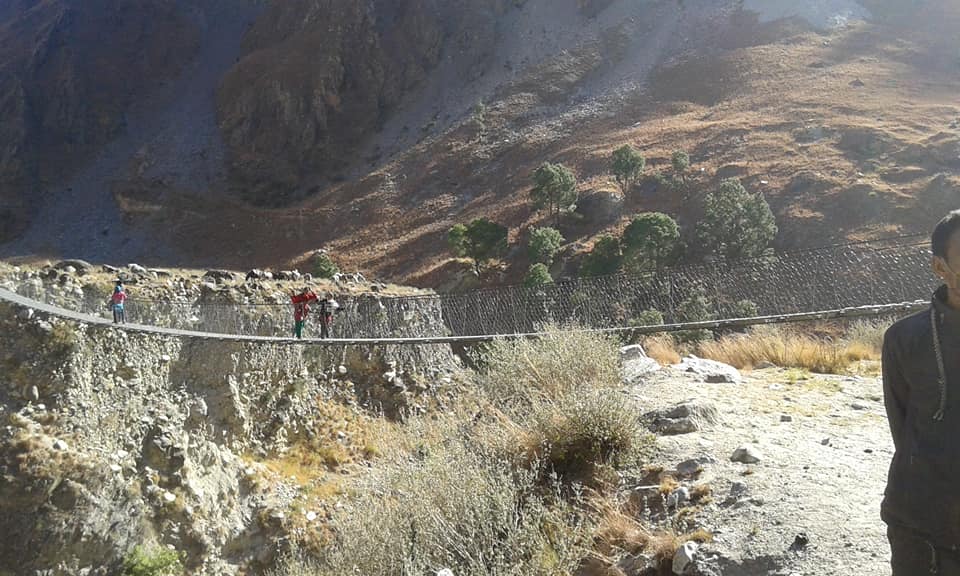
The closure of the northern trade route has severely impacted the Upper Dolpa residents’ access to basic necessities, including food and clothes. They feel left behind and face difficulties in collecting salted rice due to the border closure. Locals emphasize that the closure has caused the prices of foodstuff imported from Tibet to rise, as transportation costs escalate from Surkhet, Nepalgunj, and Dunai, leading to higher prices, with a kilo of salt reaching 200 rupees.
Despite the formation of a new government under the leadership of Pushpa Kamal Dahal, China has only reopened the Rasuwagadhi-Kerung border while other checkpoints remain closed. The Ministry of Foreign Affairs claims to be taking initiatives to open the border, but the confusion persists over the government’s understanding of the hardships faced by Dolpali residents, who are burdened with high prices of basic commodities, paying 200 rupees for a packet of salt and 6000 rupees for 25 kg of rice.

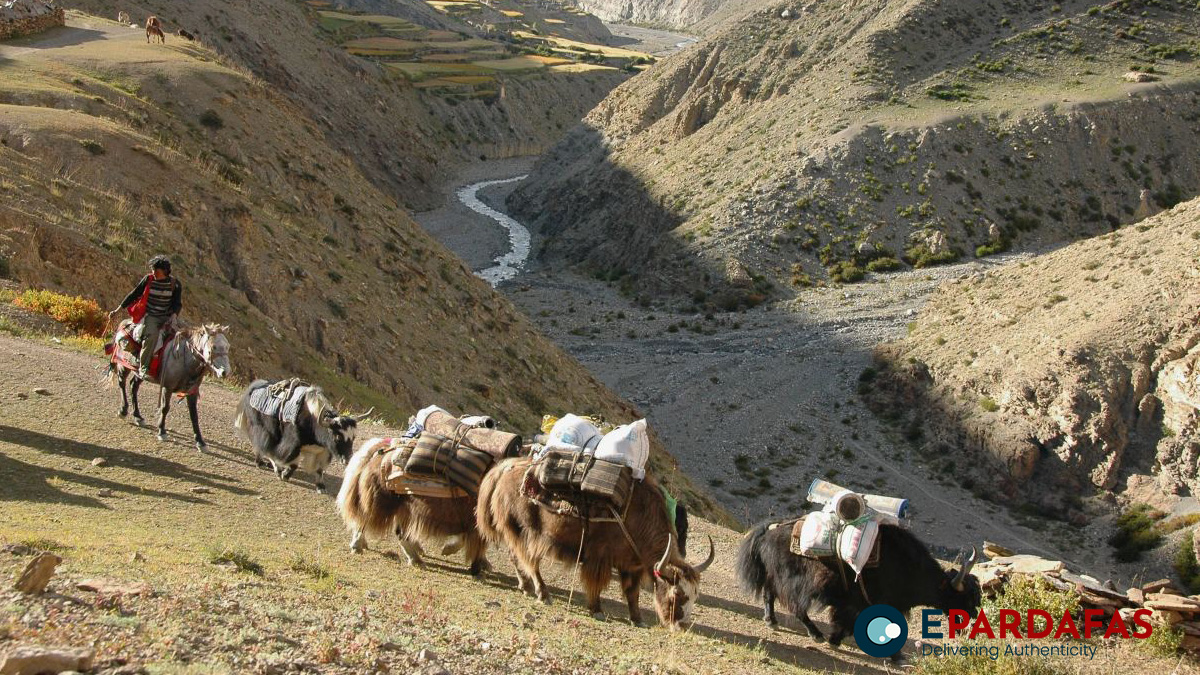




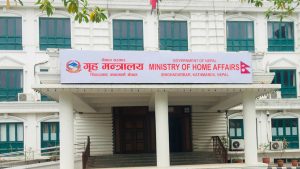








Comments